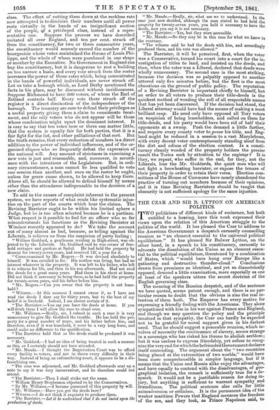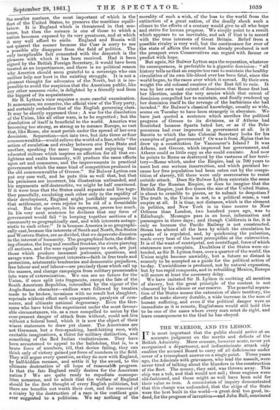THE CZAR AND SIR B. LYTTON ON AMERICAN POLITICS.
The meaning of the Russian despatch, and of the sentence we have quoted, seems patent enough, and there is no par- ticular reason to doubt that the obvious is also the real in- tention of them both. The Emperor has every motive for expressing a friendly feeling with the Americans. They alone sympathized with him in his war against France and England, and though we may question the policy and the principle involved in that sympathy, the Czar can hardly be expected not to be grateful for moral support given in his darkest need. That he should suggest a peaceable reunion, which in- volves of necessity the continuance of slavery, seems strange in a sovereign who has risked his throne to abolish serfdom; but it was useless to express friendship, yet refuse to recog- nize the veryend for whichthe befriended Government declares itself contending. The argument about the " two countries being placed at the extremities of two worlds," would have been more comprehensible in simpler language, but if it means that the Union and Russia alike enjoy the advantages, and have equally to contend with the disadvantages, of geo- graphical isolation, the remark is sufficiently true for a de- spatch. It would not be a justifiable reason for doing in- jury, but anything is sufficient to warrant sympathy and friendliness. The political sentence also calls for little animadversion or criticism. It is the permanent idea of the weaker maritime Powers that England menaces the freedom of the sea, and they look, as Prince Napoleon said, to the smaller marines, the most important of which is the fleet of the United States, to preserve the maritime equili- brium. It is England which is threatened in that sen- tence, but then the menace is one of those to which a nation becomes exposed by its very greatness, and at which it may well afford to smile. England and Russia will not quarrel the sooner because the Czar is sorry to see a possible ally disappear from the field of politics. The only inexplicable fact connected with the despatch is the pleasure with which it has been received. Had it been signed by the British Foreign Secretary, it would have been treated as an impertinence, and there is no political reason why America should seem grateful to a sovereign who can neither help nor hurt in the existing struggle. It is'not a pleasant thought for advocates of the North, but it is im- possible to avoid the suspicion that the American public, like any other nouveau riche, is delighted by a friendly nod from the biggest of its acquaintance. Sir B. Lytton's view requires a more careful examination. It announces, we conceive, the official view of the Tory party, and certainly embodies that of the English governing class. It may be shortly expressed thus : A war for the dissolution of the Union, like all other wars, is to be regretted ; but the dissolution of itself is beneficial to the world. America was becoming too strong, so strong as to menace Europe, so vast that, like Rome, she must perish under the spread of her own dominion. Separation—not into two, but into three or four commonwealths—would relieve the world of a fear, while " the action of emulation and rivalry between one Free State and another, speaking the same language and enjoying that educated culture which inspires an affection for all that en- lightens and exalts humanity, will produce the same effects upon art and commerce, and the improvements in practical government which the same kind of competition produced in the old commonwealths of Greece." Sir Bulwer Lytton can put any case well, and he puts this so well that, but that his premisses are incorrect, his illustration unfounded, and his arguments self-destructive, we might be half convinced. If it were true that the States could separate and live toge- ther peacefully, emulating each other only in the rapidity of their development, England might justifiably acquiesce in that settlement, or even rejoice to be rid of a formidable rival. But the speaker, in his eagerness, proves too much. In his very next sentence he declares that any form of government would fail "in keeping together sections of a community so geographically cast, and with interests antago- nistic to each other." It is because America is so geographi- cally cast,because the interests of South and North, Sea States and Western States, are so divided, that we deprecate disunion in the interest of humanity. The geographical facts, the differ- ing climates, the long and ramified frontier, the rivers piercing all sections, and the seas equally necessary to each, are just those which produce incessant jealousies, questions, and savage wars. The divergent interests—faith in free trade and protection, aristocratic tendencies and democratic prejudices; free labour and serf labour—are precisely those which call up the masses, and change campaigns from military promenades into wars of extermination. We can see no future for the Union, if once split into fragments, except the fate of the South American Republics, intensified by the vigour of the Anglo-Saxon character—endless wars followed by treaties made to be broken, invasions with no result but slaughter, reprisals without effect save exasperation, paralysis of com- merce, and ultimate national degeneracy. Even the Ger- mans who have tried the experiment under the most favour- able circumstances, viz. as a race compelled to union by the ever-present danger of attack from without, could not live without a federal bond, which it is now the object of their wisest statesmen to draw yet closer. The Americans are not Germans, but a free-speaking, hard-hitting race, with excitable imaginations, a thirst for military distinction, and something of the Red Indian vindictiveness. They have been accustomed to appeal to the ballot-box, that is, to a brute force of numbers, till, that device failing, they can think only of victory gained per force of numbers in the field. They will argue every question, as they do now with England, by half-hidden menace, and settle it by the sword, to the ultimate destruction of all hope of reasonablb progress. Is that the fate England really desires for the American nation ? We are quite ready to repudiate cosmopo- litan nonsense, and to admit that the welfare of England should be the first thought of every English politician, but there are benefits not worth their cost, and the removal of a rivalry by the destruction of a race is the costliest gain ever suggested to a politician. We say nothing of the morality of such a wish, of the loss to the world from the extinction of a great nation, of the deadly shock such a climax to the efforts of a century would give to all who hope and strive for human progress. We simply point to a result which appears to us inevitable, and ask if that is in accord with the true interests of Great Britain. Relief from a possible rivalry is very well, but the continuance for ever of the state of affairs the contest has already produced is not the prospect even Conservatives can regard with favour or predict with hope. But again, Sir Bulwer Lytton says the separation, whatever its consequences, is preferable to a gigantic dominion : " all history tells us that an empire too vast to maintain the healthy circulation of its own life-blood ever has been fatal, since the world began, to the races over which it spread. By their own weight the old colossal empires of the East fell to ruin. It was by her own vast extent of dominion that Rome first lost her liberties, under the very armies which that extent of dominion compelled her to maintain, and finally rendered up her dominion itself to the revenge of the barbarians she had invaded." Sir Bulwer's classical knowledge, usually so wide, seems on Tuesday to have been strangely in abeyance. We have just quoted a sentence which ascribes the political progress of Greece to its divisions, as if Athens had flourished because Sparta hated her, or as if the Pelo- ponnesus had ever improved in government at all. Is it Bceotia to which the late Colonial Secretary looks for his examples of good government ? Or was it from ./Egina that he drew up a constitution for Vancouver's Island ? It was Athens, not Greece, which improved her government, and Athens could as little copy as she could emulate. And now he points to Rome as destroyed by the vastness of her terri- tory—Rome which, under the Empire, bad in 700 years to meet but one serious insurrection, and which perished be- cause her free population had been eaten out by the compe- tition of slavery, till there were only mercenaries to resist outside attack. Does Sir Bulwer Lytton entertain the same fear for the Russian Empire, or does he imagine that the British Empire, just five times the size of the United States, is about to crumble to pieces, or to submit to despotism ? The truth is, the Union is not, in a political sense, a vast empire at all. It is time, not distance, which is the element in politics, and New York is in time nearer to New Orleans than London, two hundred years ago, was to Edinburgh. Messages pass in an hour, information and passengers in three days ; and though California is far, it is only so because the Pacific Railway is not constructed. Steam has altered all the laws by which the circulation he speaks of is regulated, and, by quickening the pulsation, made every beat of the heart perceptible at the extremities. It is of the want of centripetal, not centrifugal, force of which statesmen now complain. Doubtless if the States were ex- tended, as Sir B. Lytton fears, over a quarter of the world, the Union might become unwieldy, but a future so distant is scarcely to be accepted as a guide for the political action of to-day. Unwieldiness is produced, not by natural expansion, but by too rapid conquests, and in rebuilding Mexico, Europe will secure at least the necessary delay.
We have imitated Sir B. Lytton in omitting all mention of slavery, but the great principle of the contest is not obscured by his silence or our reserve. The peaceful separa- tion of the States means the extension of slave territory, the effort to make slavery durable, a wide increase in the sum of human suffering, and even if the political danger were as immediate as it is remote, Englishmen would still hold this to be one of the cases where every man mast do right, and leave consequences to the God he has obeyed.































 Previous page
Previous page